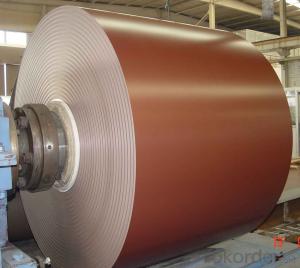Color Coated Aluminium Roll For Construction Decoration
- Loading Port:
- Shanghai
- Payment Terms:
- TT OR LC
- Min Order Qty:
- 2 m.t.
- Supply Capability:
- 60000 m.t./month
OKorder Service Pledge
OKorder Financial Service
You Might Also Like
Item specifice
Color Coated Aluminium Roll For Contruction Decoration
Specifications
Alloy | 1050, 1060,1100, 3003 3004 3105 3A21 5005 5052 etc |
Temper | O/H12/H14/H1/H18/H32/H34/H36/H38//H111/H112/H116/H321/T6/T651/T3/T351 etc |
Thickness | 0.1mm to 6mm |
Width | 20mm to 3300mm |
Coil weight | 100kgs to 6 tons depends on actual requirement |
Core material | Aluminum or paper |
Coil inner diameter | 75mm, 150mm, 200mm, 300mm, 405mm, 505mm or as required |
Appplication | construction, roofing, decoration, lamping etc |
Package | eye to wall or eye to the wall for aluminum coil with wood pallet (wooded case also available) |
Characteristics
1) Excellent weather-proof durability
2) Anti-ultraviolet
3) High erosion resistance
4) Stable color and gloss
5) Good mechanical processing performance
6) Abrasion resistance
7) Anti-impact
8) High flexibility
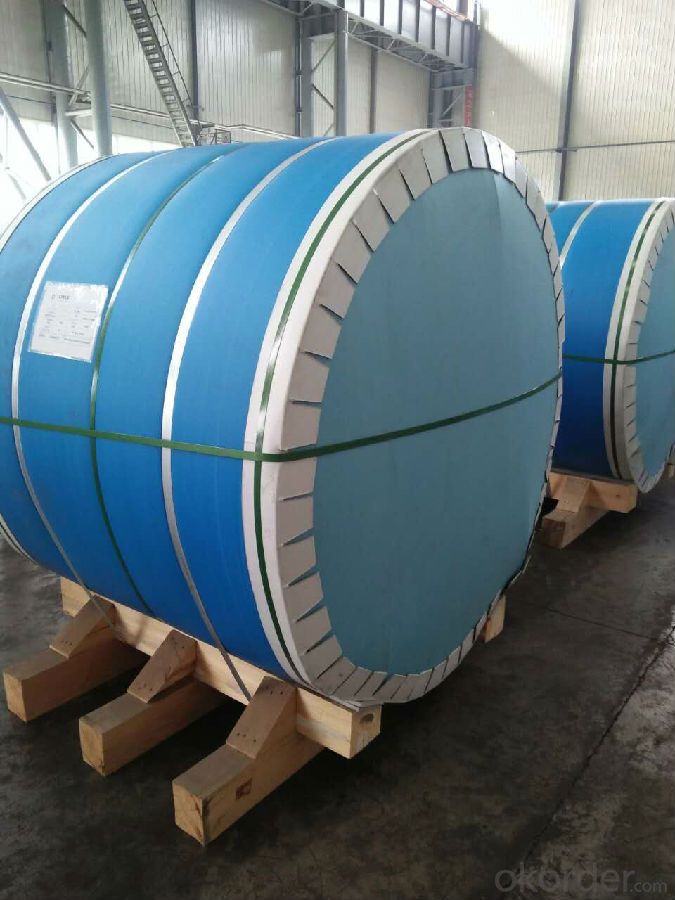
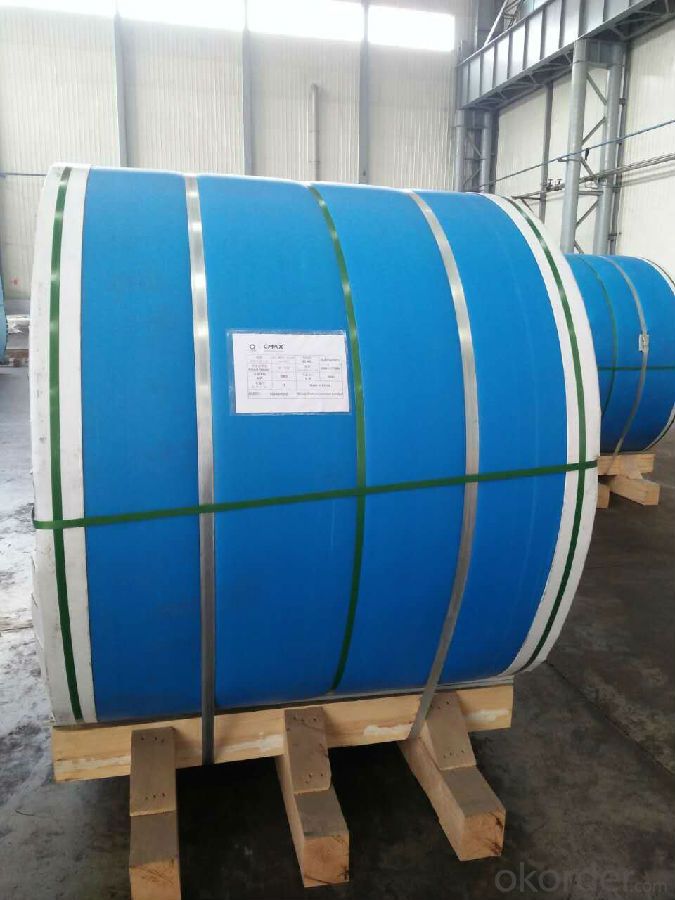
Coating varieties
Polyester Coatings (PE)
PE (polyester) coatings exhibit an excellent combination of hardness, flexibility, flow, appearance, and superior resistance to dirt retention in indoor and outdoor applications. These coatings are highly resistant to abrasion, metal marking, staining, and marring, and require minimal maintenance. Glazetech uses polyester paints which provide excellent colour and gloss retention properties.
Polyvinylidene Fluoride Coatings (PVDF)
PVDF (polyvinylidene fluoride) is a chemical resistant thick film barrier coating commonly used in architectural applications where both excellent appearance and substrate protection must be maintained over a long period of time. This coating is unaffected by most chemicals and solvents and has excellent wear and abrasion resistance. PVDF also has a high dielectric strength, excellent resistance to weathering and the ability to self extinguish.
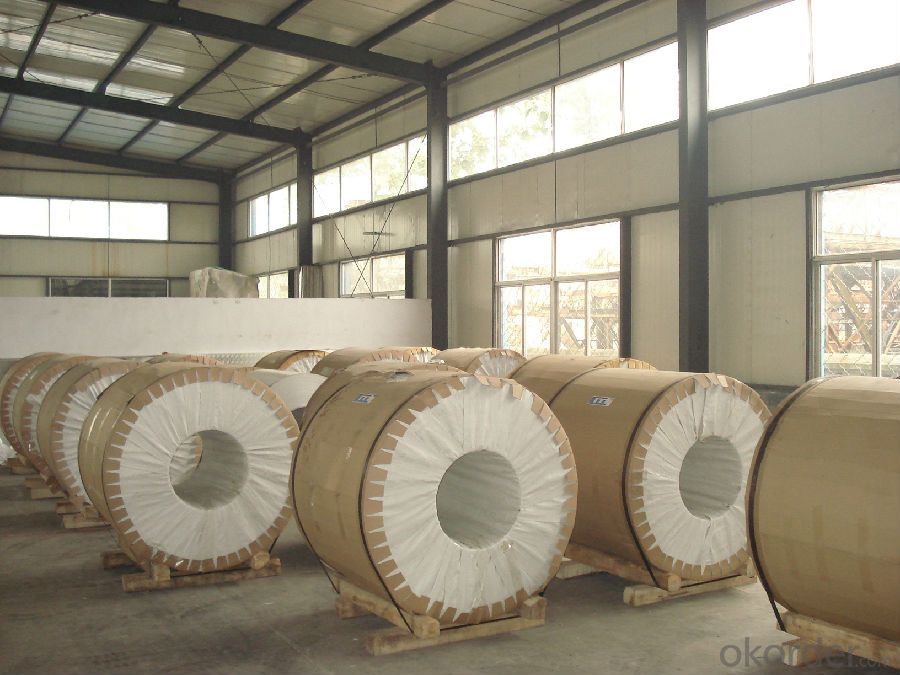
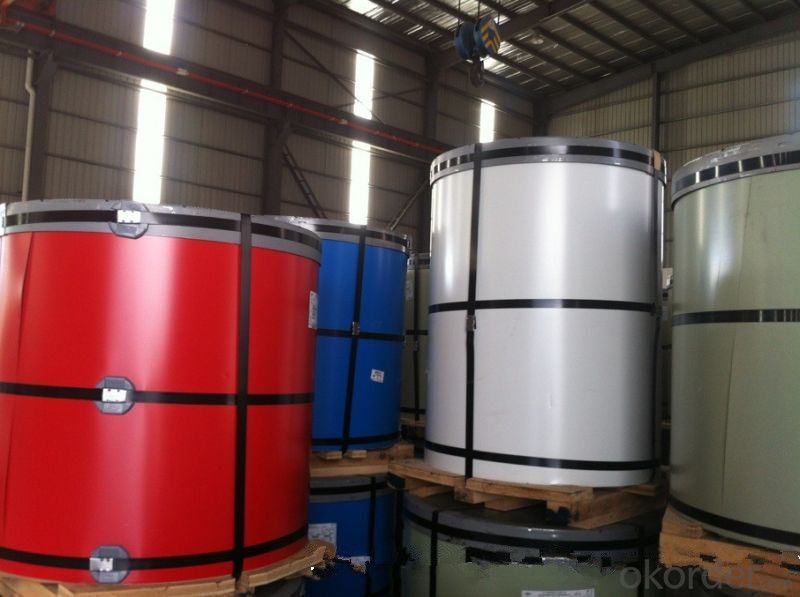
- Q:Can aluminum coils be used in pharmaceutical manufacturing?
- Yes, aluminum coils can be used in pharmaceutical manufacturing. Aluminum is commonly used in the pharmaceutical industry for various purposes, including packaging and manufacturing equipment. Aluminum coils can be used to make containers, caps, and closures for pharmaceutical products. These coils are often used in the production of blister packs, which are widely used for packaging tablets and capsules. Aluminum is preferred in pharmaceutical manufacturing due to its excellent barrier properties, resistance to corrosion, and ability to protect the integrity of the pharmaceutical products. Additionally, aluminum is lightweight, recyclable, and has a low melting point, making it a versatile and cost-effective choice for pharmaceutical manufacturing.
- Q:Can aluminum coils be used in the production of electrical enclosures?
- Absolutely! Electrical enclosures can indeed be manufactured using aluminum coils. When it comes to producing these enclosures, aluminum is highly favored due to its exceptional conductivity, lightweight properties, and ability to resist corrosion. By utilizing aluminum coils, we are able to create enclosures that are both seamless and robust, guaranteeing efficient dissipation of heat and providing optimal protection for electrical components. Moreover, the versatility of aluminum coils allows for easy molding and shaping into a wide range of forms and sizes, offering great flexibility in design. In conclusion, incorporating aluminum coils into the production process of electrical enclosures not only ensures reliability but also proves to be a cost-effective solution.
- Q:What is the typical density of aluminum coils?
- The typical density of aluminum coils is around 2.7 grams per cubic centimeter (g/cm³).
- Q:Is it possible to customize the dimensions of aluminum coils?
- Yes, it is possible to customize the dimensions of aluminum coils. Aluminum coils can be fabricated and cut to specific dimensions according to the requirements and specifications of the customer. The customization process involves precise cutting and shaping of the aluminum coil to achieve the desired dimensions. This allows for flexibility in various industries and applications where specific coil sizes are necessary. Customizing the dimensions of aluminum coils ensures that they can fit seamlessly into different production processes, machinery, or end-use applications.
- Q:Are aluminum coils suitable for heat exchanger applications?
- Yes, aluminum coils are suitable for heat exchanger applications. Aluminum is a lightweight and highly conductive material, making it an excellent choice for heat transfer applications. Aluminum coils offer several advantages in heat exchangers, such as high thermal conductivity, corrosion resistance, and ease of fabrication. They are commonly used in various heat exchanger systems, including air conditioning, refrigeration, and automotive applications. Additionally, aluminum coils can be easily formed into different shapes and sizes, allowing for greater design flexibility. Overall, aluminum coils are a reliable and efficient option for heat exchanger applications.
- Q:The specification of thermal insulating aluminum coil
- 4-0 In general, the chemical engineering products for thermal insulation is 0. According to the International standard, the thickness tolerance is +-5%.02MM. according to industrial standard, it is +-0. The production crafts are embossed and plain sheet.
- Q:How are aluminum coils protected against oxidation?
- Aluminum coils are protected against oxidation through various methods such as applying a protective coating, anodizing the surface, or using a combination of organic and inorganic coatings. These protective measures act as barriers to prevent direct contact between the aluminum coils and oxygen, thereby reducing the risk of oxidation and corrosion.
- Q:What is the typical lead time for manufacturing aluminum coils?
- The lead time for manufacturing aluminum coils can vary depending on several factors, such as the order's specific requirements, the complexity of the manufacturing process, and the manufacturer's current demand and capacity. Typically, the lead times for aluminum coil production range from a few weeks to several months. For standard aluminum coil orders that fall within the manufacturer's regular production capabilities in terms of specifications and quantities, the lead time is usually shorter, around 4-8 weeks. This timeframe includes the sourcing of raw materials, processing, and quality control checks. However, for custom or specialized aluminum coil orders that necessitate specific dimensions, finishes, or additional processing steps like coating or embossing, the lead time can be longer. These types of orders may require additional time for design and engineering, tooling setup, and testing. Consequently, the lead time for these orders can extend to approximately 8-12 weeks or even longer. It is important to consider that lead times can also be affected by external factors like the availability of raw materials, transportation delays, or unforeseen production issues. Therefore, it is advisable to communicate with the manufacturer to obtain an accurate estimate of the lead time for specific aluminum coil orders.
- Q:How do aluminum coils contribute to the corrosion resistance of products?
- Aluminum coils contribute to the corrosion resistance of products in several ways. Firstly, aluminum itself is a highly corrosion-resistant material due to its natural oxide layer that forms on its surface when exposed to oxygen. This oxide layer acts as a protective barrier, preventing further oxidation and corrosion. When aluminum is formed into coils, it offers additional advantages for corrosion resistance. The coil form allows for a more uniform distribution of the material, ensuring that the protective oxide layer covers the entire surface area of the product. This helps to prevent localized corrosion and ensures a more consistent level of corrosion resistance across the entire product. Moreover, aluminum coils can also be coated with various protective coatings or treatments to enhance their corrosion resistance further. These coatings can provide an additional layer of protection against environmental factors such as moisture, chemicals, and UV radiation, which can accelerate corrosion. Additionally, aluminum coils are often used in combination with other materials in products, such as galvanized steel or stainless steel. These combinations, known as bimetallic or trimetallic products, take advantage of the different properties of each material to enhance corrosion resistance. For example, the aluminum layer can act as a sacrificial anode, corroding preferentially to protect the underlying material from corrosion. In summary, aluminum coils contribute to the corrosion resistance of products due to the inherent corrosion resistance of aluminum, the uniform distribution of the material in coil form, the possibility of applying protective coatings, and the use of bimetallic or trimetallic combinations. These factors help to ensure that products made with aluminum coils have a longer lifespan and are better protected against corrosion in various environments.
- Q:What are the different coil coating technologies used for aluminum coils?
- Aluminum coils can be coated using various technologies, each with its own advantages and suitability for specific applications. The first method involves applying liquid coatings onto the aluminum coils. These coatings can be solvent-based or water-based and are typically applied using roll coating or spray coating techniques. Liquid coatings provide a wide range of color options, excellent chemical resistance, and good adhesion to the substrate. However, they may take longer to dry and result in uneven coating thicknesses. Another method is using powder coatings, which are electrostatically applied as a dry powder onto the aluminum coils. The coated coils are then heated to melt and cure the powder, creating a tough and durable finish. Powder coatings offer excellent corrosion resistance, UV resistance, and impact resistance. They also have a high deposition efficiency, resulting in minimal waste. However, compared to liquid coatings, they may have limited color options. PVDF coatings are a type of liquid coating known for their exceptional weatherability and durability. They are resistant to fading, chalking, and chemical exposure, making them suitable for architectural applications requiring long-term performance and color retention. PVDF coatings can be applied using roll coating or spray coating methods. Polyester coatings are widely used in various industries due to their cost-effectiveness and versatility. They offer good color retention, flexibility, and resistance to abrasion. Available in a wide range of colors and textures, polyester coatings are suitable for decorative applications. They can be applied using both liquid and powder coating methods. Polyurethane coatings provide excellent adhesion, flexibility, and impact resistance. They are commonly used in demanding applications that require durability and resistance to harsh environments. Polyurethane coatings offer good color retention and can be applied using liquid coating techniques. In conclusion, there are several different coil coating technologies available for aluminum coils, including liquid coatings, powder coatings, PVDF coatings, polyester coatings, and polyurethane coatings. The choice of coating technology depends on factors such as desired performance characteristics, application requirements, and cost considerations.
1. Manufacturer Overview |
|
|---|---|
| Location | |
| Year Established | |
| Annual Output Value | |
| Main Markets | |
| Company Certifications | |
2. Manufacturer Certificates |
|
|---|---|
| a) Certification Name | |
| Range | |
| Reference | |
| Validity Period | |
3. Manufacturer Capability |
|
|---|---|
| a)Trade Capacity | |
| Nearest Port | |
| Export Percentage | |
| No.of Employees in Trade Department | |
| Language Spoken: | |
| b)Factory Information | |
| Factory Size: | |
| No. of Production Lines | |
| Contract Manufacturing | |
| Product Price Range | |
Send your message to us
Color Coated Aluminium Roll For Construction Decoration
- Loading Port:
- Shanghai
- Payment Terms:
- TT OR LC
- Min Order Qty:
- 2 m.t.
- Supply Capability:
- 60000 m.t./month
OKorder Service Pledge
OKorder Financial Service
Similar products
New products
Hot products
Related keywords
